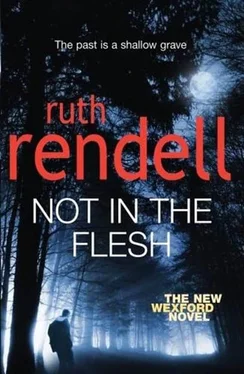“Let me get this clear, you hadn't put the pipes in the trench?”
“Oh, no, nothing like that. He'd got them on order but they hadn't come, thank God. Well, I filled in the trench, end of story.”
“Not exactly, Mr. Runge. Tell me something. Think carefully. Did you shovel the earth back by putting in a layer the length of the trench and then going back to the beginning and putting in another layer and so on until it was filled up? Or did you fill the trench completely as you went along?”
“Come again?”
Wexford did his best to put his questions more clearly but, by the look on Runge's face, failed again. Burden came to his rescue by producing from his pocket a ballpoint and his notebook. “Let me draw it,” he said.
A neat sketch was quickly achieved, three separate cross sections of the trench depicting how it would have appeared a quarter filled, half-filled, and completely full. Nodding, comprehending at last, Runge settled for the middle version. He had half-filled the trench, gone home when it got dark, returned to finish the job the next day.
“You say you worked in the evenings,” said Wexford. “It was June and the evenings would have been light till late.”
“June, it was. Didn't get dark till half-nine.”
“Can you pinpoint the date, Mr. Runge?”
“It was the sixteenth of June. I know that for sure. It was my boy's birthday, he was seven, and he was mad at me for staying out working late. I made it up to him, though.”
It always brought Wexford pleasure to come upon a good parent, something that happened all too seldom. He smiled. “Did you see anyone while you were working? I mean, did anyone come into the field? Did anyone talk to you?”
“Not that I recall.”
“People do cross that field, walking their dogs.”
“Maybe, but don't let poor old John know it.” Runge put up one finger, as if admonishing himself. “I tell a lie,” he said. “There was one person who came to talk to me. Mrs. Tredown. Like one of the Mrs. Tredowns, the young one, not that she's very young. Came across the field from her place. I said good evening to her. Very polite I was which is more than she was to me. I don't remember her exact words, I mean it was eleven years ago. ‘So he can't build his houses,’ she said, something like that. ‘I'm glad,’ she said, ‘I'm overjoyed. I'd like to dance on his effing trench,’ she said, only she didn't say ‘effing.’ I reckon that's why I've remembered, her language and her supposed to be a lady. ‘We won,’ she said, ‘God is not mocked.’ I reckon she isn't all there-two sandwiches short of a picnic, like they say.”
“By ‘we won’ she meant the neighbors' opposition to Mr. Grimble's plan had succeeded?”
“That's about it.”
Burden said, “I think you'd have told us if anything had been put into the trench overnight? Or if you'd seen anything untoward about the trench?”
“I would have, yes. I know what you're getting at. I saw about it on telly. I mean, a skeleton wrapped in purple rags, that's not the kind of thing you wouldn't notice, is it?”
Returning to the car, Wexford said to Burden, “What did he mean by ‘one of the Mrs. Tredowns,’ do you know?”
“Search me.”
Wexford asked his question again when they were back at the station. The fifth person he asked knew the answer. Barry Vine laughed, then said, “He lives with his two wives. It's not like bigamy, him and the first one got divorced all right and I don't suppose there's any ‘how's your father,’ if you get my meaning. Not with the first one anyway. And Tredown's not a well man.”
“You mean his ex-wife came back to live with him and his second wife?”
“Something like that, guv. I don't know the ins and outs of it. They're a weird lot, but I think they all get on. Tredown's ill now. Heart, I think, or it may be cancer. We'll have to talk to them, won't we?”
The Olive and Dove, not many years ago a quiet and conservative country inn with one bathroom to five bedrooms, a public bar as well as a saloon, prawn cocktail, roast lamb, and apple pie served for lunch, and music unheard within its precincts, had gradually become a smart and fashionable hotel, awarded four stars in the Good Hotel Guide. Once it had stood at the entrance to Kingsmarkham, overlooking the bridge that crossed the Kingsbrook (a sizable river notwithstanding its name), and it was still where it had always been, though the bridge had been widened and the shopping area extended to where once there had only been great beech trees, water meadows, and a cottage or two. The beech trees were still there, though now they grew out of the pavement, and the water meadows had retreated a quarter of a mile or so. As for the cottages, they were now weekenders' residences, newly thatched and double-glazed.
Among its new bathrooms, its sauna, spa, Crystal Bar and Moonraker's Bar, its workout room, its room called, for some unknown reason to non-francophones, Chez l'Ordinateur, its winter garden, and its “quiet room,” the old snug remained. Rumor was that the Olive had retained it solely-or at any rate, partly-at the request of Chief Inspector Wexford, backed up by its best barman who had said if it went it would be over his dead body. “We don't want any more dead bodies round here,” was Wexford's rejoinder, but now they had one and it was eleven years dead.
“So we can pinpoint death to eleven years ago last June,” Burden was saying as he carried to their table Wexford's requisite red wine and his own lager. “What do we think happened? Sometime at the end of May, Grimble and Bill Runge started to dig the trench but on the twelfth Grimble's application was refused. I checked with the planners. Four days later, on the sixteenth, Runge filled in half the trench. After dark, X's killer or an accomplice lifted out some of the earth, laid the body wrapped in a purple sheet inside, and replaced the earth. There'd be nothing to show the trench had been tampered with. Next day Runge finished filling it in.”
“Something like that. Was it a sheet?”
“That's what the lab says. It's in rags, but once it had been a purple sheet.”
“Who has or had purple sheets? I wonder. The whole job would have been easy enough. The toughest part would have been carrying the body. He's not likely to have been killed out there.” Wexford took a small draft of his claret. “It's funny, I know it can't be like that, but I fancy I can see this stuff flowing into my arteries and magically melting all that nasty gunge that clings to their walls. Of course it's not at all like that.”
“No, it's not,” said Burden. “My brother-in-law had a thing called a colonoscopy and he watched what they were doing on a screen. He said his intestines looked like they were lined with pink satin.”
“Modern medicine is wonderful. I just wish we didn't have to hear about it day in and day out. In the Middle Ages they say people brought God into the conversation all the time, and with the Victorians it was death. We talk about our insides. Ah, well. Now, we have a precise date for the burial, if not the death. Probably death occurred hours or, at most, days before. Whoever killed X must have known about the trench. It's not visible from Pump Lane or the Kingsmarkham Road.”
“It would be visible from windows.”
“Yes, we shall have to check that. I'd guess Athelstan House, Oak Lodge, and Marshmead, wouldn't you? Possibly Flagford Hall too. Was he a local man, Mike? Or was he here on a visit? Eleven years is a long time. We're going to get pretty tired of that phrase before we're done. Most of them, young or old, walked across that land regularly. However much Grimble dislikes it, all the houses that abut the field have got gaps in their fences or even gateways that give them access.”
Читать дальше











